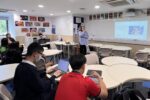Year 12 CAS – STC Virtual MUN Conference

CAS stands for Creativity, Action, and Service, and it is one of three essential elements that every student must complete to receive the IB Diploma. While not formally assessed, CAS provides opportunities for students to enhance their personal and interpersonal development through hands-on learning.
One of the components of CAS is a ‘CAS Project’, a collaborative series of student-initiated CAS experiences over several months engaging students in one or more CAS strands (creativity, activity, and service). Following the five CAS stages of Investigation, Preparation, Demonstration, Action, and Reflection, students can explore their passions whilst challenging themselves to initiate purposeful action around defined goals. The following months will bring a series of interviews where the STC Media Team interviews different students around school to highlight their CAS projects and initiatives.
This week, Connor Coventry speaks to the STC Media Team about his CAS project STC Virtual MUN Conference. He initially joined MUN in Year 9 and thoroughly enjoyed the experience. Now, after nearly four years in the club, he wants to use CAS as an opportunity to give back to the community by starting STC’s very own MUN conference.
Can you introduce the STC Virtual MUN Conference? What intentions does your CAS project have?
MUN conferences are school wide competitions where students come together to participate in debates and discussions on current global issues; working together to come up with solutions or responses from the perspective of different countries that they represent. My CAS project aims to host one of these events at STC as a way of creating more opportunities for students both within and outside of our school.
What impact/outcome do you hope your project will have on the community?
I hope that it will have an impact on the awareness of MUN and create a place for people to discuss political and global issues through the medium of MUN. As for what I hope the outcome of the conference will be, I think it would be easy to judge the success of the conference by the amount of people that took part in it. However, I believe it is more important to consider the quality of it and what people gained, and as a result, I hope that the conference will have a positive impact on people’s knowledge of the world around them.
Are there any events/initiatives planned to take place?
The project itself is an event, and I hope that it will take place in a few months time. It will be open to all those that wish to participate, even those that do not have much experience, with the hope of getting more people involved in MUN.
Any changes due to COVID-19? How have you adapted?
COVID has certainly made hosting an event more difficult; even communicating with people has gotten harder, not to mention the restrictions on in person gatherings. As a result, we’ve moved the conference online, in the hopes that it will make it more accessible to more people.
How do you think MUN can help students improve their leadership skills, critical thinking and social awareness?
The conference is entirely run based on students leadership and organization, and it is the students that make up those that are involved. The activities that the participants will be engaging in are all based around debating and public speaking skills that help develop students critical thinking and social skills.
Do you have any advice for shy students who wish to improve their public speaking skills?
Join MUN. It may seem daunting at first and people are rarely, if not ever, natural public speakers. It is only by putting yourself out there and forcing yourself beyond your comfort zone that you can get better at public speaking. I know I wasn’t a partially confident or outspoken student and I certainly wasn’t in the first or second MUN conference I went to, but by challenging myself I got better and that, for most people, is the only way to do so.
Written and edited by: Clarisse Kwan

